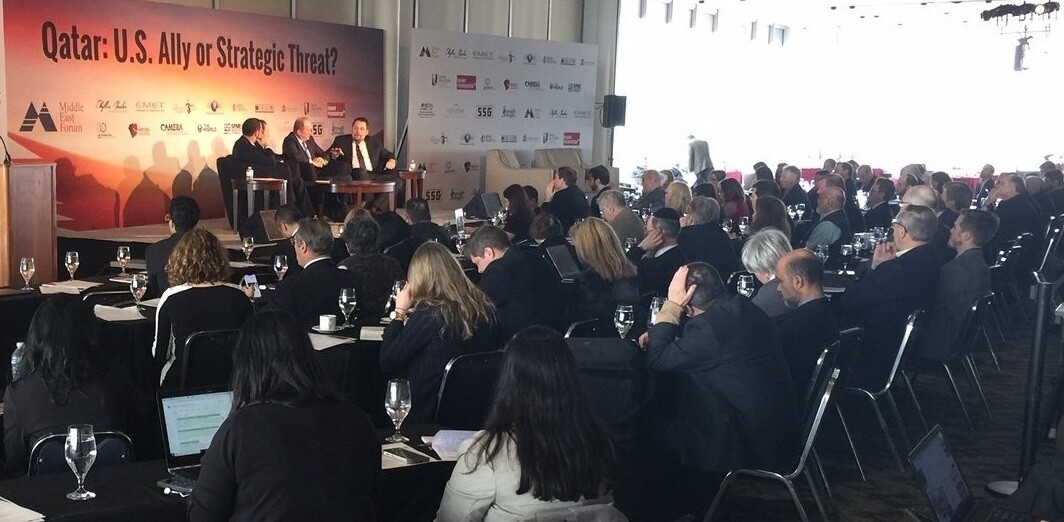The Middle East Forum hosted experts, officials and over 100 attendees on February 6 in Washington, D.C. for a first-of-its-kind conference examining whether Qatar is a U.S. ally or global menace. (Click here for conference videos.)
“It’s not too much of an open question,” said MEF president Daniel Pipes, noting the #QatarTheMenace Twitter hashtag. “The wealth of the country and the drive of its leadership have made it into an international force.”
“We need to know who our friends are and who our foes are,” said Rep. Roger Marshall (R-KS) in opening remarks. “You can’t be both.”
Members of Congress, area experts, former military officials, former intelligence officials, and analysts, from the U.S., UK, Germany and Israel, made it clear that Qatar is no friend; providing new ideas and information for journalists, politicians, policy-makers and the public.
“The Qatari regime has covertly and openly funded, hosted and supported jihadists for decades,” said MEF director Gregg Roman. “But its support for jihadi groups does not just stop at violence. It also goes into the realm of spreading non-violent Islamism in the West, which is hardly ever discussed, despite the billions of dollars that Doha has poured into schools, universities, mosques, TV stations, sports clubs, PR firms, and of course, into the pockets of politicians and their influencers.
“The idea that Saudi Arabia – which has put itself on the path toward reform – somehow remains the world’s chief sponsor of Islamism and jihad is out-dated and needs to be corrected. This role now belongs to Qatar, which must be held to account.”
“Let’s take this message to the world,” concluded Mr. Pipes.
Conference Highlights:
- Qatar as an Islamist Benefactor – Qatar funds Islamic extremists operating lawfully across the world, from Bangladesh to North America. It spreads Islamist ideology through the Qatar Foundation, which has injected at least $8 million into American public schools, and provided contracts and monetary gifts worth at least $720 million to U.S. universities since 2011.
- Understanding the Iranian-Qatari-Turkish Alliance – Qatar has built close ties with fellow Islamist regimes, including Turkey and Iran, while providing Tehran with access to foreign currencies. “We have seen Qatar become increasingly cozy with Iran,” said Rep. Jack Bergman (R-MI). “Qatar is clearly a problematic country, but to this point the United States has not taken enough action.”
- Qatar’s New Influence War – A range of Qatari lobbying, cyber espionage, and disinformation efforts against U.S. citizens and others around the world have been exposed in recent months. “The reason they’re so ‘helpful’ in counter-terror operations is because they know all the terrorists – because they fund them,” said Jim Hanson, president of the Security Studies Group.
- A Global Media Empire – Qatar uses Al-Jazeera, the Qatar-owned news outlet, and other media assets to promote hard-line Islamism and hatred of the West, Israel and America. “There is a mistake made in our analysis: the major problem is not that Al-Jazeera has false information, and not that it is deeply anti-American, or even anti-Israeli or anti-Semitic,” said former State Department official Alberto Fernandez. “Rather the greatest problem is that it has mainstreamed and normalized an Islamist grievance narrative that enables radical Islamist movements.”
- The FIFA Fraud – Qatar’s bid for the 2022 World Cup was marred by controversy, from allegations of bribery to allegations from Amnesty International of rampant modern-day slavery resulting in the death of thousands of migrant workers. “If you think politics has dirty undertones, you should take a look at the world of sport and football,” said Jaimie Fuller, president of the Foundation for Sports Integrity.
- Qatari Victims Speak Out – A terror victim, a prominent rabbi hacked by Qatar, a parent of an American murdered by terrorists, and a human rights lawyer, in conversation. Rabbi Shmuley Boteach, “America’s Rabbi,” demands a proper moral accounting by those Jewish leaders who took Qatar’s influence money (at 38:12 in the video).
- A Conversation – Catherine Herridge, chief intelligence correspondent for Fox News, and Gen. (ret.) Charles Wald, former deputy commander of the U.S. European Command, discuss a range of issues, including the U.S. Air Force base in Qatar and the need to focus on Saudi Arabia as a strategic partner of the U.S and counterweight to Qatar.




